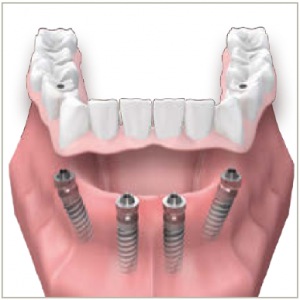Dr. Kaufman has much success in treating damaged teeth or diseased gum tissues. But some times the disease is so advanced that teeth need to be removed. Once removed teeth can be replaced with bridges implants or dentures.
A denture is usually a removable restoration which implies, it needs to be taken out frequently and cleaned separately. Dr. Kaufman has a fixed solution for denture wearers that provides much satisfaction and restores function with 4 to 6 implants. It is usually known “All on 4” or “Fixed on 4”.
There are two types of removable replacement for missing teeth and surrounding tissues. For those who miss some but not all their teeth Dr. Kaufman can make a partial denture while for those who lost all their teeth, they will need a full or complete denture.
Complete Dentures
Complete dentures replace all the teeth in the upper or lower jaws. In the instance that some of the teeth are present but compromised, they need to be removed and Dr. Kaufman can prepare a denture that will provide an immediate replacement. This “Fixed removable” denture (as seen on the right) can be fitted on the same day, to the jaw with 4-6 implants to provide aesthetic and functional solution. Or if the patient chooses to have just an “immediate” denture after the removal of the teeth it needs to be glued in place in order to be functional. After a healing period 8-12 weeks a “conventional” denture can be placed since after an extraction, the bone and gums shrink over time, especially during the healing period following tooth removal.
Partial Dentures
If only one or more teeth are missing and they need to be replaced a removable partial denture can be made to attach to the remaining teeth and replace the missing ones. It has the shape of the missing teeth embedded in a pink or gum-colored plastic base connected by metal framework that holds the denture in place in the mouth. Not only does a partial denture fill in the spaces created by missing teeth, it prevents other teeth from changing position.
Since the denture is retained in place by the remaining teeth it has hooks that grasp them. These hooks can damage the supporting teeth and cause either a gum disease or decay.
With the use of implants these dentures can be anchored to implants instead of to teeth and spare the remaining teeth.
Caring for dentures
New dentures may feel a little odd or loose for a few weeks until the muscles of the cheeks and tongue learn to keep them in place and you get comfortable inserting and removing them. In this initial period it is frequent to have sores from the denture rubbing against the oral tissues, the solution is to visit the dentist and have the pink base reduced in the area of the friction. Dr. Kaufman uses an impression technique to diminish this occurrence.
Eating with new dentures will take some practice and may be uncomfortable for some wearers for a few weeks. It has been compared to learning to walk again. For a start have soft foods cut into small pieces, chew slowly using both sides of your mouth and use glue to gain confidence. As you get used to the way dentures function, add other foods until you return to a normal diet. Be cautious with hot or hard foods and sharp-edged bones or shells. Avoid a diet which is extremely sticky or hard since it may break the denture or dislodge it.
The dentures need to be removed and cleaned after every time you eat. Place a towel such that in case they slip they don’t break. Clean your mouth after removing your dentures then reinsert them.
Scrub your dentures at least daily using a denture cleaner, mild soap or dishwashing liquid and a denture brush or soft toothbrush to remove all deposits. Be sure you don’t bend or damage the plastic or the clasps when cleaning.Avoid stiff-bristled brushes, strong cleansers and harsh toothpaste, as these are too abrasive and can damage your dentures. Toothpastes advertised as whitening pastes are especially abrasive and should be avoided with removable dentures.
Soak dentures overnight. Most types of dentures need to remain moist to keep their shape. Place the dentures in water or a mild denture-soaking solution overnight. Rinse dentures before putting them back in your mouth, to avoid swallowing harmful chemicals.
Schedule regular dental checkups to have your dentures examined.